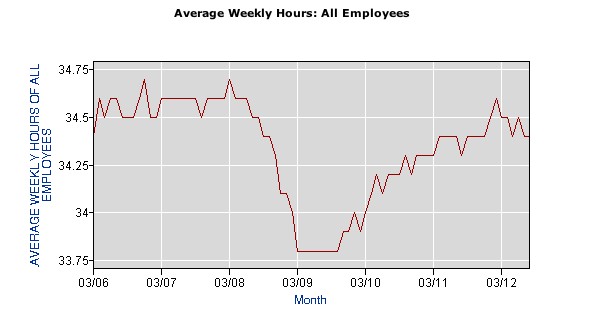One of the most passionately held premises amongst conservatives and the Republican Party is that employers’ fear of taxation and regulation is what’s holding back job growth. The unspoken corollary to this premise is that demand in the economy is fine as is — that consumers could be buying far more goods and services than they are.
But as the Center for Economic and Policy Research noted on Monday, this theory is empirically testable. Measurable data in the economy would behave one way if the taxes-and-regulations theory is correct, and another way if the lack-of-demand theory is correct. A prime example is average weekly hours worked by employees across the economy:
If employers are seeing increased demand but don’t want to hire because they fear an attack from the regulation monster or higher taxes then they would work their existing work force more hours. That one should be pretty painless even for our fearful job creators. After all, do we really think that they would turn away customers from their stores, restaurants, and factories rather than have workers put in a few extra hours each week?
In other words, weekly hours worked will be up if the problem is taxes and regulations, and down if the problem is weak demand. Here are the numbers from the Bureau of Labor and Statistics:

Weekly hours worked remain down from their pre-recession level. This is not the behavior of businesses held back by government interference, but of businesses hiring as many employees as consumer demand in the economy justifies.
This finding echoes a report put out by the Economic Policy Institute last year. It noted that weekly hours worked, as well as several other economic indicators, are not behaving in accordance with the “taxes and regulation” narrative. In fact, while the 2008 recession blew a much deeper hole in the economy than previous recessions, the pace of private sector job growth in the current recovery is on par with the recovery after the 2001 recession under President Bush. That doesn’t square with the theory that America now faces a uniquely burdensome threat of taxation and regulation brought about by Obama and the Democrats.
